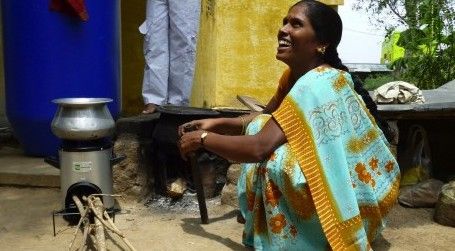Extinguishing the Killer in the Kitchen

You may realize that ordering delivery or going out to dinner is a luxury. What you may not realize is that even cooking at home with gas or electric devices is not a possibility for the majority of Indians. And you may also not know that the alternative this population relies on is killing them.In India, 725 million people – that’s 70% of the entire Indian population – cook using biomass fuel (mostly wood and cow-dung) on mud stoves or open fires inside their poorly ventilated homes[i]. Cooking this way is highly dangerous; household air pollution from indoor cookstoves is the #1 health risk in all of South Asia and accounts for 4 million premature deaths throughout the world, every year[ii]. Open fires and mud stoves emit particulate matter that causes lung cancer, heart and lung disease, pneumonia, meningitis, and low birth weight in infants.
Greenway Grameen Infra (GGI), a Mumbai-based startup, offers rural consumers a cleaner, more efficient, and more convenient way of cooking. GGI’s co-founder and CEO, Neha Juneja, tells us that her product, the Greenway Smart Stove, reduces smoke emissions by 80% and fuel consumption by 65%.
“By design, our stoves enhance airflow to the combustion chamber, increasing efficiency drastically,” says Juneja, who holds a B.E. in Production and Industrial Engineering and MBA from FMS Delhi. The increased efficiency means less dangerous particulate matter is released. In turn, the carbon footprint of domestic cooking, which accounts for 25% of the world’s black carbon emissions, is lessened[iii].

But are long-term impacts like reduced health risks and environmental benefits important factors to consumers? Even if they aren’t, rural consumers clearly see the immediate, tangible drawbacks of their current cooking method; heavy smoke causes stinging eyes and scratchy coughs, and soot produces unsightly blackened walls.
“We spent a year traveling through rural India and co-creating the stove with potential consumers,” says Ankit Mathur, Juneja’s co-founder and GGI’s COO. “The desire for a cleaner, more comfortable home was readily apparent.”
Moreover, wood isn’t cheap for those using it as their primary cooking fuel: it must either be collected or paid for, wasting the productive hours of rural women or draining family income, respectively. Although most of us city-dwellers think we spend a lot of money on LPG, rural households actually pay a much higher percentage of income on cooking fuel than urban households do.
For these reasons, the Greenway Smart Stove has been flying off the shelves; in little over a year, tens of thousands of stoves have been purchased at a price of Rs. 1299. GGI distributes the product across small retail shops in six states and 42 districts. Regional distributors and shop owners continually come back for repeat orders. GGI’s Head of Outreach, Francesca Jones, attributes their success to consumer insight.
“The number one thing we’ve realized is that rural women want beautiful, modern appliances,” Jones says. “So we design cookstoves that are not only effective but aspirational.”
It’s a business model that has been receiving vast international attention; in November, the Greenway team won the Grand Prize at Intel Global Challenge at UC Berkeley and in December the stove was featured as one of Fast Company’s “Top 14 Design Stories of 2012. Recently, Greenway was selected for the 2013 Unreasonable Institute, where the world’s most promising entrepreneurs pitch their venture to hundreds of potential funders and receive intensive consulting sessions with top mentors over the course of 6 weeks. Past mentors at the Institute include highly successful venture capitalists and executives from Google, Apple, LG Electronics, Hewlett-Packard and more.
Want to help scale this solution? Send the company to the Unreasonable Institute by clicking here to donate.
[i] http://www.censusindia.gov.in/2011census/hlo/Data_sheet/India/Figures_Glance.pdf
[iii] http://www.thelancet.com/journals/lancet/article/PIIS0140-6736(12)61766-8/abstract
[iii] http://www.cleancookstoves.org/resources/fact-sheets/cookstoves-and-climate-1.pdf








![[Funding alert] Ola Financial Services raises Rs 205 Cr from Matrix Partners, others](https://images.yourstory.com/cs/2/e641e900925711e9926177f451727da9/yourstory-Ola-opens-Ola-Money-to-other-ecommerce-1590560930663.jpg)
![[Funding alert] CpaaS startup CometChat raises $1.6M from US and Indian VCs](https://images.yourstory.com/cs/2/b87effd06a6611e9ad333f8a4777438f/Imageoxty-1597817824151.jpg)